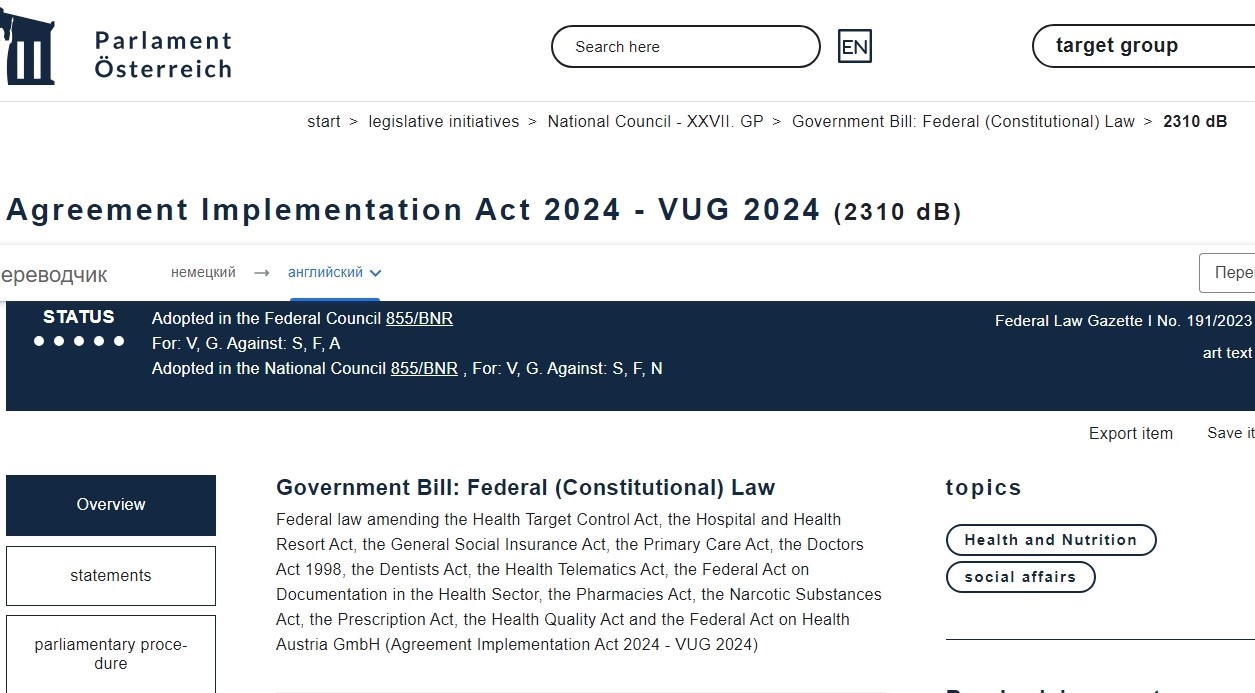Federal Law “Vereinbarungsumsetzungsgesetz” (VUG) 2024 introduced changes to 13 laws to reform healthcare and to create the legal framework for the revision of planning. The bill aims to strengthen the private practice sector, expand digital services, support health promotion and disease prevention, and improve financial sustainability.
The Federal law VUG 2024 was adopted in the Federal Council 855/BNR, and it amended the following 13 laws:
- the Health Target Control Act,
- the Hospital and Health Resort Act,
- the General Social Insurance Act,
- the Primary Care Act,
- the Doctors Act 1998,
- the Dentists Act,
- the Health Telematics Act,
- the Federal Act on Documentation in the Health Sector,
- the Pharmacies Act,
- the Narcotic Substances Act,
- the Prescription Act,
- the Health Quality Act, and
- the Federal Act on Health Austria GmbH
Most of the changes were enforced since 1 January 2024, with the last ones to be effective by 2028.
In regard to how the health sector will develop starting from 2024, the Federal Ministry of Social Affairs, Health, Care and Consumer Protection (the Ministry) reported:
In order to ensure that high-quality healthcare that meets needs can continue to be provided in the future, it is planned that the provision of preventive, health-promoting and curative services will follow the principle of “digital before outpatient before inpatient”. A concept for a targeted, high-quality and binding process for patient journeys through the increasingly complex and specialized healthcare system is to be developed.
…The aim is to reduce the burden on inpatients in acute hospitals by shifting services to day clinics or outpatients for medical and macroeconomic reasons. The federal government will provide an additional EUR 900 million annually for this purpose.
In the area of eHealth, the expansion of the public and health telematics infrastructure in particular needs to be intensified as a solid convergent foundation for far-reaching digitization in the health care system and at the interface with the nursing care system (eHealth).
The Ministry also emphasized the long-term financial viability of the public health system which is to be ensured by the continuation of jointly agreed expenditure ceilings:
In addition to the rapid implementation of primary care and other activities to strengthen the outpatient and hospital outpatient sectors, the key focuses of the target management agreement for the years 2024 to 2028 were the promotion of joint integrative care planning, the expansion of digitalization in health care and measures to improve child and adolescent health, to ensure quality and to strengthen health literacy.
Iliyana Sirakova and Verena Schnittler from a legal firm “Schönherr Rechtsanwälte GmbH” wrote in their newsletter publication that this federal bill brought the biggest reforms in the healthcare sector:
After years of small-scale adjustments, a collective amendment – the “Vereinbarungsumsetzungsgesetz 2024” (“VUG 2024” or the “reform”) – has brought a new wave of changes somewhere revolutionising healthcare in Austria… For a long time, the Austrian healthcare system was only geared towards the treatment of illnesses, lacking clear responsibility for health promotion or illness-prevention. Consequently, there has been a lack of emphasis on increasing the proportion of healthy life years.
Schönherr summarized the changes brought by VUG 2024 as follows:
Expansion and services: Several hundred additional health insurance fund posts are to be established, the number of primary care centres is to be tripled, and group practices and outpatient clinics are to be given a simpler approval process.
Funds and programs: An additional EUR 60m per year shall flow into health-promotion and illness-prevention programmes. EUR 90m a year should be made available for free vaccinations in the future.
Evaluation board: A new evaluation board is to prevent shortages in medication, especially for selected high-priced and specialised pharmaceuticals and other highly specialised forms of therapy. The evaluation board is to prepare uniform nationwide recommendations for application, framework conditions and for supporting price negotiations. It will make its decision based on a comparison between therapeutic alternatives and cost-effectiveness. However, the composition of the evaluation board has been met with fierce criticism, especially as representatives of patient advocacy groups have no voting rights. There is great concern that access to medicines will be restricted because decisions are made on a purely economic basis.
Telemedicine in the spotlight: In line with the motto “digital before outpatient before inpatient”, digital health services, the electronic health record (“ELGA”) and the health advice hotline “1450” will be expended and strengthened. Mandatory diagnosis coding is to be introduced in the private practice sector. Thus, elective doctors and not only physicians who have a reimbursement contract with the public social insurers will be obliged to use the ELGA and e-card system from 2026 onwards. This should have a steering effect, as people will no longer automatically go to hospitals but will be treated at the “best point of service”.



